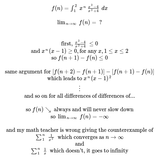Anonymous
6/29/2025, 9:39:39 PM No.16710441
>math problem in class
>come up with a different solution but same answer
>teacher says it's wrong and gives a counterexample
>be not convinced
>let is pass because social anxiety
>three months later, remember you're still not convinced
>spend 2 hours learning and typing latex so /sci is happy
Please tell me I'm right
>come up with a different solution but same answer
>teacher says it's wrong and gives a counterexample
>be not convinced
>let is pass because social anxiety
>three months later, remember you're still not convinced
>spend 2 hours learning and typing latex so /sci is happy
Please tell me I'm right
Replies:




